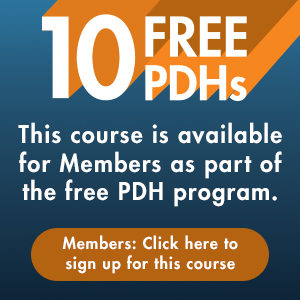
View Important Policies and System Requirements for this course.
This webinar was co-sponsored by ASCE's Geo-Institute(G-I) and ASCE Continuing Education
Instructor: Maria Chrysochoou, Ph.D, M.ASCE
Course Length: 1.5 Hours
Purpose and Background
Chemistry is usually the least favorite course of civil engineering students and, in most cases, civil engineering professionals. Why does one need to know chemistry to build roads, bridges and sky-scrapers? This course will illustrate that understanding the chemistry of subsurface materials (aka geo-chemistry) can save time and money for clients and provide civil engineering companies with a competitive edge.
This webinar is divided into two sections: the first part discusses how geo-chemistry plays an important role in everyday practice. Geotechnical and geo-environmental problems are specifically the target, with topics such as: karst development and assessment, acid mine drainage, characterization and stabilization of clays, effect of geo-chemistry changes during traditional soil testing, assessment of recyclable materials in earthwork, corrosion of steel and concrete structures in the subsurface and geo-chemistry applications in contaminated site assessment and remediation. Emphasis is placed on how understanding of geo-chemistry can be utilized as a resource to reduce the amount of costly testing often required for design purposes.
The second part of this webinar addresses principles and tools available to obtain geo-chemical information. The topics covered are: basic thermodynamic principles, mineral stability and geo-chemical modeling; a brief review of soil mineralogy and its potential impact on mechanical behavior; geo-chemical modeling tools; spectroscopic techniques that can provide insight into system geochemistry, such as quantitative X-ray diffraction, electron and optical microscopy, infrared spectroscopy and other X-ray based techniques. Emphasis is placed on what type of information can be extracted from each technique and how geotechnical professionals can get access to them.
Overall, this webinar will provide geotechnical and geo-environmental engineers with a broad overview of the relevance of geo-chemistry in various aspects of the profession and with a guide on how to strategically utilize geo-chemistry tools to reduce materials testing requirements and acquire a competitive edge that can differentiate you in the eyes of prospective clients.
Learning Outcomes
Upon completion of this course, you will be able to:
- Describe the role of chemical reactions in several geotechnical and geo-environmental engineering problems
- Select the appropriate tools to analyze the geo-chemistry of geo-materials
- Incorporate appropriate geo-chemical considerations in relevant design applications
Webinar Benefits
Acquire a competitive advantage over companies that offer only standard mechanical analyses
- Reduce costs associated with soil and material testing
- Develop common language with geologists, chemists and other people involved in geo-environmental projects
- Learn about areas of research and development in geo-chemistry and spectroscopic techniques as related to geo-technical and geo-environmental engineering
- Find out about opportunities to engage in sponsored research activities with collaboration between geo-chemists and geotechnical/geo-environmental engineers
- Explore opportunities to expand professional/research activities and services
Assessment of Learning Outcomes
Students' achievement of the learning outcomes will be assessed via a short post-assessment (true-false, multiple choice and fill in the blank questions).
Intended Audience
Geotechnical and geo-environmental engineers will benefit from this webinar. Environmental engineers with limited knowledge in soil chemistry and spectroscopy may also benefit.
Webinar Outline
- Introduction: what is geo-chemistry? What are the questions a Geo-chemist asks versus the questions a geotechnical and geo-environmental engineer are interested in?
- Examples of problems in the geotech/geo-environmental engineering profession where geo-chemistry plays a key role:
- Site characterization and remediation – examples of specific studies with firing ranges and EPA Superfund sites
- Understanding regulatory tests and avoiding pitfalls
- Clay characterization and swell potential
- Chemical soil stabilization – design and evaluation
- Use of recyclable materials in geotechnics – how to select and evaluate them
- Karst geo-chemistry
- Acid mine drainage – formation and mitigation
- Corrosion of steel and concrete structures in soil
The focus in presenting these topics is on relating the chemistry component with design considerations and to outline the broad issues that are often overlooked in professional practice. Finally, a brief description of geo-chemistry tools and analyses will be provided, with focus on the type of information that can be extracted from them and the availability and cost of these techniques.
How to Earn your CEUs/PDHs and Receive Your Certificate of Completion
To receive your certificate of completion, you will need to complete a short on-line post-test and receive a passing score of 70% or higher within 1 year of purchasing the course.
How do I convert CEUs to PDHs?
1.0 CEU = 10 PDHs [Example: 0.1 CEU = 1 PDH]
